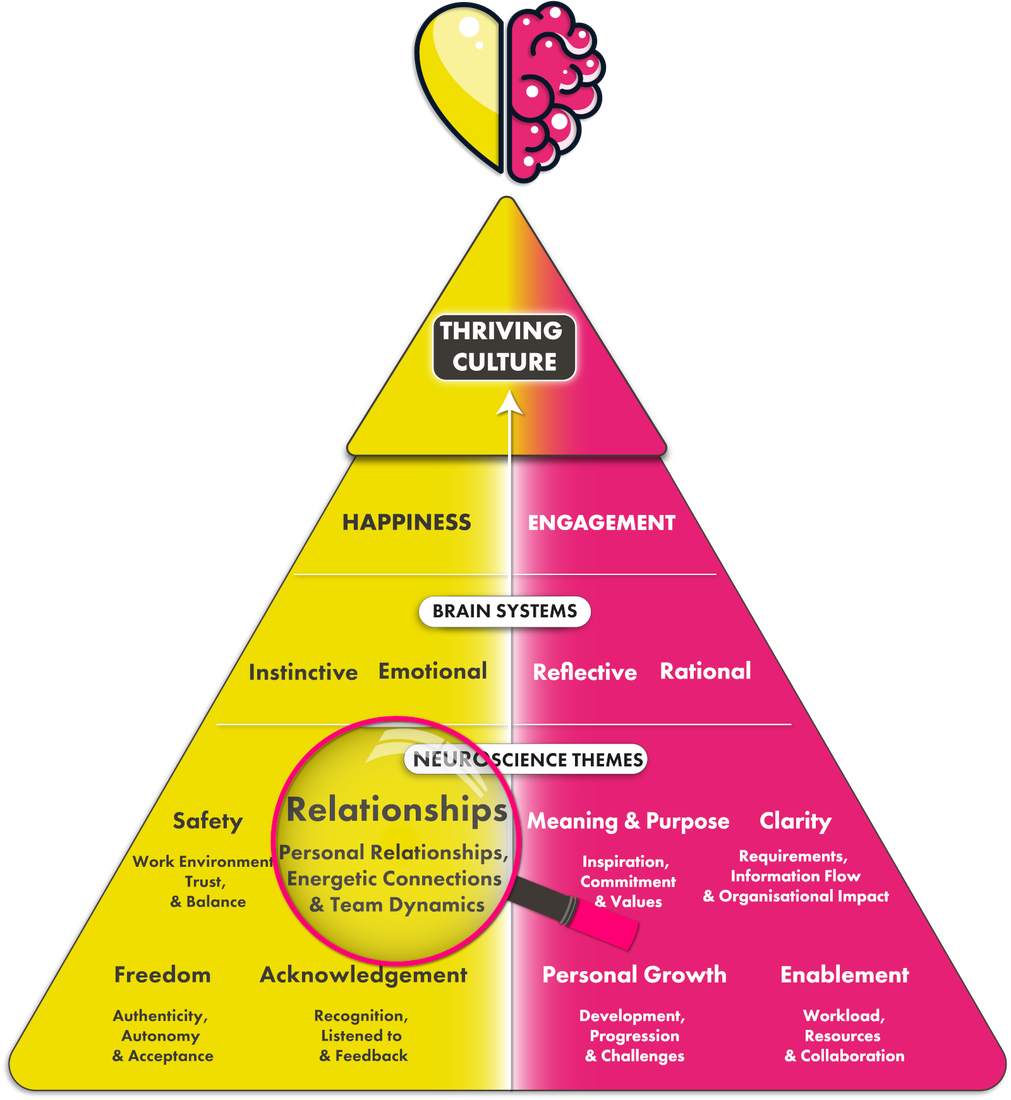Menu


Positive personal relationships are very important for our own happiness, both in the workplace and our personal lives. Unsurprisingly, relationships are linked to the Emotional brain system in our neuroscience model.
If you’ve just landed on this page, we recommend reading our introduction to brain systems and the neuroscience themes for more context. Otherwise, read on for everything you need to know about how our happiness can be dictated by personal relationships in the workplace.

Team dynamics are imperative for productivity, creativity, innovation, and the overall success of the company. They create a sense of community and a collective bond, which is a vital social ingredient to our emotional needs and allows us to feel a sense of belonging.
Aligned teams are more productive and have better communication, greater employee engagement, higher retention rates, and increased resilience (Gallup).

Gary Rich, the former CEO of WD-40, wrote in his book Tribe it’s important as the CEO to embrace and build a culture where people feel good and feel part of the tribe. It will be clear because the culture is there, and it’s coming from the top-level management.
Phil Jackson, who coached the Chicago Bulls and LA Lakers, also wrote about tribal leadership. He says there are five stages of a team.
Stage one: Members do not believe that greatness can be achieved.
Stage two: Teams have a cynical view toward improvement.
Stage three: Nobody appreciates what I do.
Stage four: Passing the Ball, you start to believe in yourself as a team and feel like you’re a tribe but still obsessed with the people within your team that you’re trying to beat.
Stage five: Magic! The team’s mantra is “life is great.” Highly evolved teams remove ego from the equation.
There was a small survey in Denmark that asked when was the last time you didn’t feel happy at work and what was the reason. The number one reason why people did not feel happy at work was not getting the recognition or the positive feedback that they felt was deserved. It’s making people unhappy at work. Creating a culture where it’s not only acknowledgment from the top, but where everyone remembers to acknowledge each other. Recognition has the highest standard deviation of all areas and a big impact on employee happiness.
Managers that only look at deliveries based on measurements in excel spreadsheets is a very old-school way of thinking. As managers, we should also look at the person who is really good at expanding their learnings and knowledge outside of their current roles. If you want people to knowledge share, you need to reward them for sharing knowledge.
Instead of only reviewing KPIs, we should also be looking at behaviour- BPIs (behaviour personal index). This is how they behave in the team dynamic. Look at these BPIs when rewarding your people, when you’re deciding promotions and new role opportunities. These decisions shouldn’t be based on numbers alone but should include behavior as well.
When collaboration isn’t encouraged through rewards and praise, people will often keep knowledge to themselves because they only see the benefit on an individual level. They fight and compete more, which is not great for the team dynamics, and in these cases, are actually disappearing. People will not help or support each other. There is no knowledge share because people know they will be rewarded individually. If you take away individual rewards, the negativity will instantly disappear.
Managers spend time getting to know your people. How do they like to work? How do they like to be recognised? Help them master new things so that they can become better. Ask yourself, how do I help this person to develop in their work? We become happier if we feel we’re creating meaningful work and know we are making a difference, so help the people in your teams make a difference.
As the CEO, you have to be very visible and not just hide in your office, you need to walk the talk. If you want your leaders and middle managers to create a culture where everyone belongs, you must do it too. Walk the talk as a CEO; you need to meet people. You need to talk to people. You need to set aside time in your calendar every single day, to go out and talk to your people. If you don’t work on nurturing the relationships, they will disappear.
*This is an excerpt from the Happiness and Humans Podcast with Arlette Bentzen, the Chief Happiness Officer at Arbejdsglæde (Danish for happiness at work). Click here to listen to the full podcast.
Related articles
Get in touch for a platform tour and a chat with one of our experts to see how we can help you.
Use our ROI calculator to discover how much we can improve your business performance.